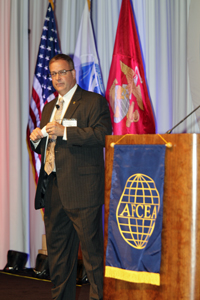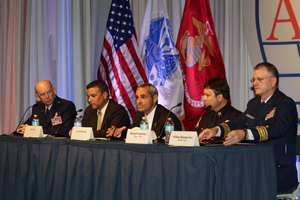A Matter of Trust
Online Show Daily: TechNet Land Forces South Day One
 |
| John A. Wilcox, director of communications systems and chief information officer of U.S. Special Operations Command, delivers the first keynote address of TechNet Land Forces South. He spoke about his major concerns and how industry can help him better carry out his missions. |
Gen. Titshaw explained that a major lesson learned from the WikiLeaks scandal is that while everyone focuses on expanding the envelope of technology capabilities, people can become the weak link in the security chain. He also said that commanders need to do a better job of finding the vulnerabilities from the human factor, realizing that not everyone who should be on the same team really is.
Rear Adm. William D. Baumgartner, USCG, commander, Seventh Coast Guard District, cited another result of the WikiLeaks debacle—personnel becoming less candid. With fears that what is said might reach a larger audience than intended, people take fewer risks with ideas and suggestions.
John A. Wilcox, director of communications systems and chief information officer of U.S. Special Operations Command (SOCOM), talked about the need for trust between industry and government. He wants to know that industry members can deliver what they promise as well as feel secure that the private sector will properly protect SOCOM information. Also, he emphasized the damage done when companies protest for the sake of protest. “That is not helpful,” Wilcox stated.
Border security is a key national security sector that requires partners to have confidence in each other. This protection begins at the source in foreign countries and continues to within the United States. Often, the cycle links back to the source in terms of money flowing to pay for arms or other dangerous resources. Covering all the areas of concern, including the maritime environment, requires cooperation among a range of organizations with various authorizations. No single agency has the mandate to manage all of the threat locations.
Drug smuggling and mass migration are the two biggest concerns for border security personnel. According to Gen. Titshaw, “If you don’t think mass migration affects border security, you have to rethink.” Perhaps even more concerning is the money available through drug smuggling, making it alluring for many, including terrorists. The worldwide drug trade pulls in hundreds of billions of dollars a year; in North America alone, drug smuggling brings in $147 billion annually. Jose Soto, the Drug Enforcement Agency (DEA) intelligence liaison to SOCOM, said, “Nothing else comes close to that.” Human trafficking nets approximately $32 billion a year, with illicit arms trading pulling down about $11 billion. “Terrorist organizations want to somehow be in the drug trade,” Soto stated. A concern for partners is that terrorists will go beyond financing operations through drug smuggling and begin using the routes to move in people who can carry out attacks.
 |
| Members of the Securing Our Borders: Interagency Cooperation panel discuss key elements of their partnerships as well as major threats to the United States. |
Adm. Baumgartner shared that one of the major points of border security is not to catch bad guys, but to stop dangerous events before they occur. Another key is determining the best nodes where forces should apply pressure. For example, interdicting cocaine at sea is preferable to doing so on land. Within the United States and at its borders, partners intercepted approximately 40 tons of the drug in a year. During the same time frame, forces intercepted that same amount only in one body of water in only one class of vessel.




Comments